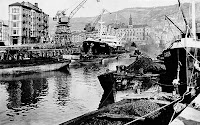An Englishman came to Bilbao
to watch the estuary and the sea
but when he saw the local girls
he wouldn't go away.
(Un inglés vino a Bilbao
por ver la ría y el mar,
pero al ver las bilbainitas
ya no se quiso marchar)
People from all places think the girls in their town, city or whatever are the most beautiful in the world, and talking about local girls as of a sort of produce you can be proud of wasn't considered incorrect at the time the song appeared –and later.
We cannot be sure, anyway, if the man in the song was English, Welsh or Scot, because people here were not (and still are not) very skilled at distinguishing one from another, so they called them all “English”.
Looking on the web for something on this subject (Englishmen in Bilbao, Britons in Biscay) I came across an issue of History Today where Mike Thomas wrote about Bilbao's Britons: Mining in Biscay.
Why was I looking for it? Because Britons played an important part in the industrialisation of Biscay, which relied on the importance of the iron mines.
Professor Manuel Montero, from the university of the Basque Country (UPV-EHU) tells the story this way:
“Iron was mined in Biscay since the Middle Ages but it was halfway the Nineteenth Century when a new epoch opened. Iron from Biscay suddenly gained huge interest for the English steel industry after a new process was invented around 1950 in order to obtain steel. Bessemer converters were able to render a product of superior quality, better than usual until then, but it was necessary to employ a certain kind of mineral which was very scarce in England: non phosphoric iron ore. There were only two places in Europe where it was abundant: Sweden and Biscay. Iron ore from Biscay presented better conditions to be exploited for the English demand: it was very rich and easy to extract for it could be found near the surface. The mines war not far away from the coast, so it could be transported without great cost. And even mining was cheap because there was plenty of labour at the industry's disposal. Unlike the sweden ore, iron ore from Biscay could be extracted and shipped all the year through.”
The article on History Today has a subhead:
“Mike Thomas looks back to a period of economic buoyancy in the Basque region, when a special relationship flourished between the people of Biscay and Britain”
Then the author introduces William Gill, who far back in the mid-1880s was the British managing director of the Orconera Iron Ore Company, a conglomorate of British, Spanish and German enterprises in the Biscay region.
And so, through the Gill family we find ourselves right in the middle of that time when industrialisation was taking off in Bilbao and its surroundings and there was a British community of several hundreds settled in Abando (which disappeared as an independent town in 1890 being today the central district of Bilbao), Bilbao itself, Portugalete and Baracaldo.
Touch the photograph to go to Mike Thomas' article, but I advise you that to read it from beginning to end you must subscribe to History Today.


No comments:
Post a Comment